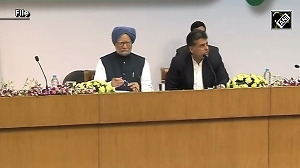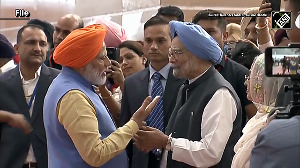Senior ministers of the Indian government told a group of international investors on Saturday that India was committed to more reforms in the education sector to ensure that there was no shortage of skilled manpower to sustain an annual growth rate of over 8 per cent in the coming years.
Finance Minister P Chidambaram said of the 500 industrial training institutes that were to be offered to the private sector, the handing over of 80 had already been completed under the unique public-private partnership initiative.
Planning Commission Deputy Chairman Montek Singh Ahluwalia added that a new policy on beefing up the education sector was expected to be finalised soon by the Knowledge Commission, set up at the initiative of the prime minister.
He admitted that the availability of water was an important ingredient for growth and assured investors that funds had already been earmarked for undertaking water management projects, particularly in the rural areas.
Commerce and Industry Minister Kamal Nath defended the recently liberalised policy permitting foreign direct investment in the retail sector on the ground that it would encourage employment growth and back-end investment. The objective of the policy was neither to supplement nor complement the local retail shops, he added.
He said India was keen on promoting design-driven manufacturing and invited international investors to help the government frame a policy to attract more of such investment.
On the much-debated question of comparing China with India, Chidambaram asserted that the two countries were not in race against each other.
"We are on an autonomous growth path. We have different political systems and we have followed different models of growth. And we believe that private flows in the world are enough to meet the demand for both India and China," he said.
Taking part in a session on global economy at the annual meeting of WEF later in the day, Chidambaram, however, said while his government would pursue the right fiscal policies, it was at the same time concerned about worsening global imbalances, a rise in protectionist tendencies and the slow progress in the Doha Round of trade talks.
He pointed out that capital must flow from developed to developing countries. "But what has happened is just the opposite," he said, arguing that the millennium development goals would be meaningless unless the capital flows were reversed.
Chidambaram was responding to Lawrence H Summers, president of Harvard University, who had earlier said any attempt by the United States to withdraw from its policy of import-led growth would mean an adjustment for the rest of the countries since they could not then carry on with their export-led growth policies.
Chidambaram's counter-argument this viewpoint was that any such adjustment would take place over time as the direction of exports would change with the US beginning to save more and developing countries beginning to rely more on their domestic markets.
Martin Wolf, chief economics commentator of Financial Times, pointed out that any such adjustment could lead to a recession and that was a fear which most policy makers might not like to live with.
Chidambaram argued that the developed countries, perhaps justifiably, wanted to maintain the living standards of their people. But in this process they were oblivious to the needs of the developing countries, he said.






 © 2024 Rediff.com -
© 2024 Rediff.com -